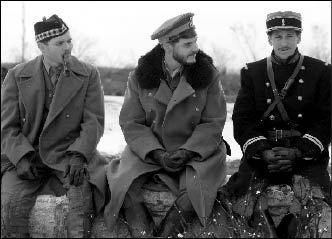Next story: The Devil Gets the Best Lines: Thank You for Smoking
Holiday Retreat: Joyeux Noel
by M. Faust

Seldom have I ever been moved by a film as I was by Joyeux Noel, one of this year’s nominees for the Oscar for Best Foreign Language Film. (It certainly deserved to win more than the South African film that did take the prize, Tsotsi, which is scheduled to open here next week.)
This handsomely produced drama is based on the true story of the Christmas Eve in 1914, the first year of World War I, when British, French and German soldiers entrenched in a French battlefield lay down their arms for the day to celebrate the holiday as best they could. Coming from countries nearer to each other than many American states are, sharing the same religion, they found that they had one more thing in common with each other and no one else: the experience of sitting for weeks and months in cold, wet trenches, never knowing when they would be called upon to fight or to die.
The actual Christmas truce has been a legend for so long that many may think of it as mythic. It’s a story that appeals to us because it speaks of an innate desire for peace. But this film written and directed by Christian Carion goes deeper. It examines the means through which governments rouse their people to war, enlisting teachers, clerics and the media to whip the public in a frenzy of bloodlust.
Joyeux Noel opens with schoolchildren from different countries singing propaganda songs about what subhuman monsters the enemies are. More damningly it ends with a man of the cloth chastising those under him for insufficiently hating the enemy, proclaiming that they “do not think like us—they are not children of our lord.” He may actually believe this, or he may be trying to manipulate his staff. Both are unforgiveable.
Carion’s point is so basic that it makes the film sound almost simpleminded to spell it out: Wars can occur only when one group of people can be led to deny the humanity of another group. It’s a lesson that can’t be repeated too often, though, and he does so with skill, interweaving a large number of characters and actors speaking different languages with clarity. (It’s ironic that, while many war films suffer from the fact that soldiers in battle tend to look indistinguishable, this film about soldiers discovering their lack of differences does such a good job of keeping them distinct.)
Researched in great detail, the events depicted are true. It reminds us of the elemental, personal horrors of a four-year catastrophe that led to the deaths of 10 million people, reminding us why it was referred to, for too short a time, as “the war to end all wars.” And it ends with scenes of official foolishness reminiscent of Stanley Kubrick’s Paths of Glory, a film to which it deserves to be compared. It’s that good. And it’s only likely to be in town for one week, so put off whatever else you were thinking of seeing this weekend to make room for it.
|
Issue Navigation> Issue Index > v5n14: A New Day for Studio Arena (4/6/06) > Film Reviews > Holiday Retreat: Joyeux Noel This Week's Issue • Artvoice Daily • Artvoice TV • Events Calendar • Classifieds |









 Current Issue
Current Issue